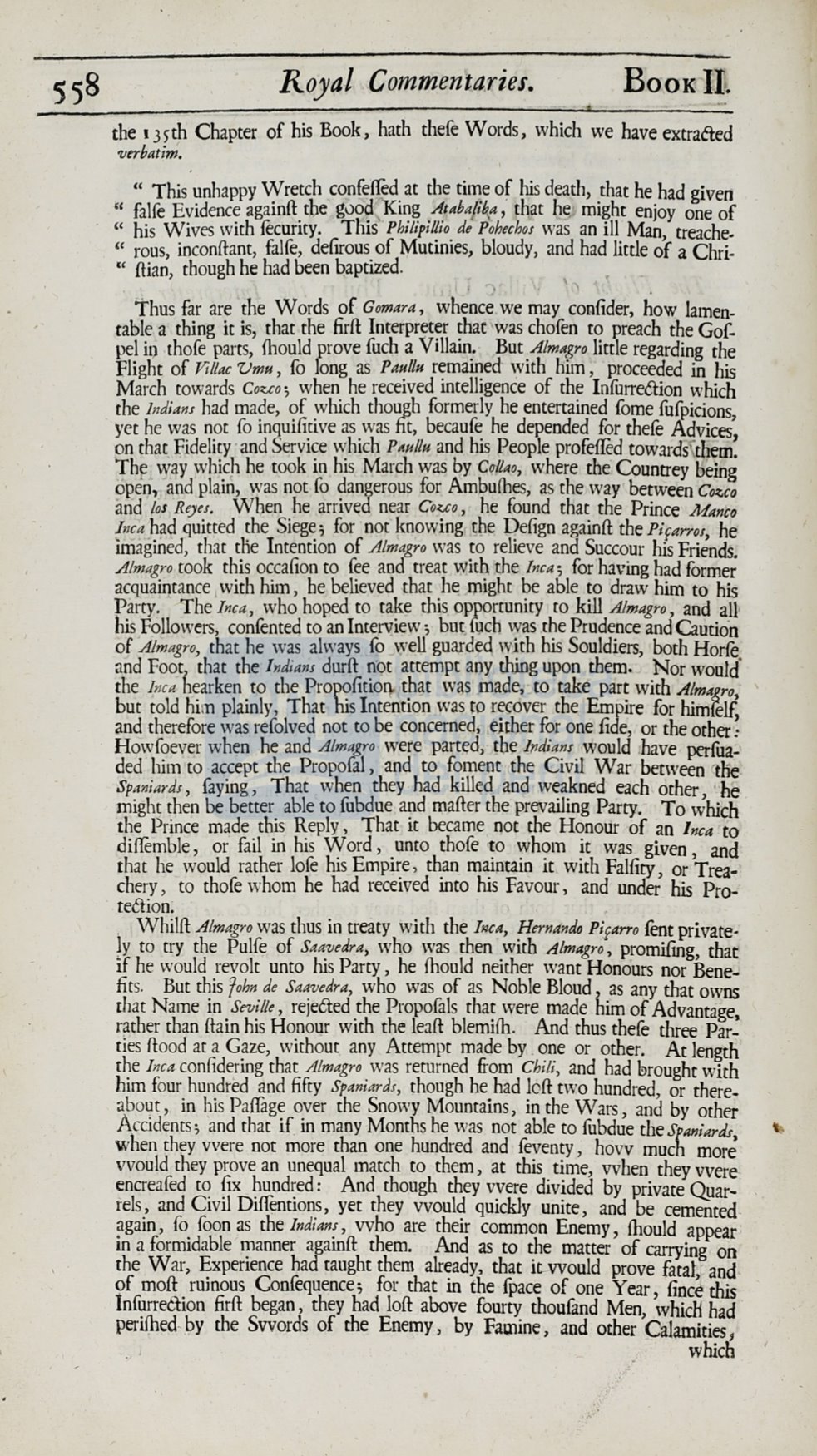

558
Royal Commenta.rie.r.
BooKU.
the
1
35
th Chapter of bis Book, hath thefe Words, which we have extraékd
verbatim.
'' This unhappy Wretch confefled_ at the ti~e of
his
death, _that he had given
" falfe Evidence againíl: tbe guod',Kmg
A~aba/1ba,
that he; m1ght enjoy one of
" bis Wives with fecurity. This
PhilipiUio de Pohechos
was an ill Man
treache–
,, rous, inconíl:ant, falfe, defirous_ of Mutinies, bloudy, and had little
o'f
a Chri–
" füan, though he had been qapt12ed.
\
.
1
1
.-.,
Thus far are rhe Words of
Gomara,
whence we may conftder, how lamen–
table a thing it is, that the firft Interpret~r ~hac was chofen tC! preach t~e Gof–
pel
it)
rhofe parts, íhould prove fuch a V11lam_. But
_Almatro
httle regardmg the
Flight of
Vtllac
Vmu,
fo long as
Pa~llu
r~ma~ed· ~1th h1m, procee~ed in bis
March towards
Couo;
when he rece1ved mtelhgence of che lnfurreéhon which
the
Jndians
had made, of which thou_gh formerly he entertained fome fufpicions,
yet he was not fo inquilicive as was
fit,
becaufe he depended for thefe Advices,
on rhat Fidelity ·and Service which
P11ullu
and his People profeífed towardúhem.
Tht way which he took in his March was by
Cqllao,
where che Countrey being
open, and plain, was not fo dangerous
for Ambufhes, as the way between
Co-tco
and
los Reyes.
Wben he arrived near
Co.uo,
he found that the Prince
Manco
Inca
had quitted che Siege; for ·noc kn
owingrthe Defign againft the
Pifan-os,
he
1magined, rhat ene lntention of
Almagro
was to relieve and Succour hís Friends.
Almagro
cook chis occafion to fee and treat Wit~ che
Inca;
for having had former
acquaintance wich
him ,
be believed chac he rn1ghc be able to draw him to bis
Party. The
Inca,
who hoped to take this opportunity to kill
Almagro,
and all
his
Followers, confented to an Interview; bue,f1,1ch was che Prudence and Cautio"n
of
Almagro,
rhac he was always fo well guarded v,r,~ch his Souldiers, both Horfe.
and Fooc
thac che
Indians
durfi not atternpc any th,ng upon thern. Nor would
the
Inca
Í1earken ro che Propoíicioq. that was macle, to take pare with
AlmagrfJ,
but cold him plainly, That his lntention was ~o recover che Ernpire for himfelf,
and cherefore was refolved not co be concerned, ejther for one fide, or the other:
Howfoever when he and
Almagro
were pam;d, tbe
ifldia~s.
would ihave perfua–
ded him to accepc the Propoíal , and to fornenc the ClVll War between
'tne
Spaniards,
faying, That when they had killed and weakned each other, ·he
mighc then be betcer able to fubdue and maíler che prevailing Party. To which
the Prince rnade chis Reply , Thac ic became not che Honour of an
Inca
to
diífemble, or fail
it1
his Word , unto thofe 'to whom it was given , and
chac he would racher lofe his Empire, than maintain it with Falftty, or Trea–
chery,
to
chofe whom he had received inco his Favour, and under his Pro–
cefüon.
, \i\!hilíl
Almagro
was thus in treaty wich che
J,m,,
Herna'ndo Pi.farro
fent private·
ly to cry the Pulfe of
Saavedra,
who was chen with
Alm11gro,
promifing, chac
if he would revolt unto bis Party, he íhould neicher want Honours nor Bene–
fits.
But chis
'fohn de Saavedra,
who was of as Noble Bloud
as any that owns
rhac Name in
Seville,
rejeéted che Propofals that were rnade him of Advamage,
rather chan fiain his Honour with che leaíl blemiíh. And chus thefe three Par–
des ílood at a Gaze, without any Atcempt made by one or other. At length
the
Inca.
confidering that
Almagro
was returned from
Chili,
and had brought wich
him four hundred and fifty
Spaniards,
though he had loíl: cwo hundred, or there–
ab0t;it, in his Paffage over che Snowy Mountains, in che Wars, and by ocher
Accidcrncs; and thac if_ in many Months he was not able to fubdue che
Sfani11rds,
when chey vvere not more than one hundred and fevemy , hovv much more
vvould rliey prove an unequal match to them, at this time, vvhen they vvere
encreafed co fix hundred: And chough rhey vvere divided by privare Quar–
rels, and Civil Di~ntions, yet they vvould quickly unice, and be cememed
again, fo foon as che
Jndians,
vvho are their common Enemy, íhould appear
in a formidable rnanner againíl: them. And as to the matter of carrying on
che War, Experience had caughc them already, that it-vvould prove fatal and
of rnoft ruinous Confequence; for chat in the fpace of one Year, fine~ this
lnfurrefüon firíl: began , they had lofi above founy thoufand Men, whicli had
periíhed--
.PY
che Svvords of che Enemy , by FaQJine, and other Calamities,
.
which














